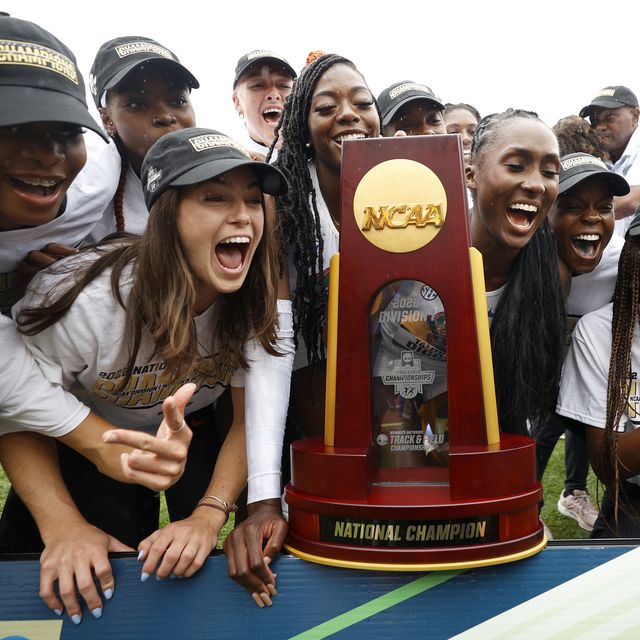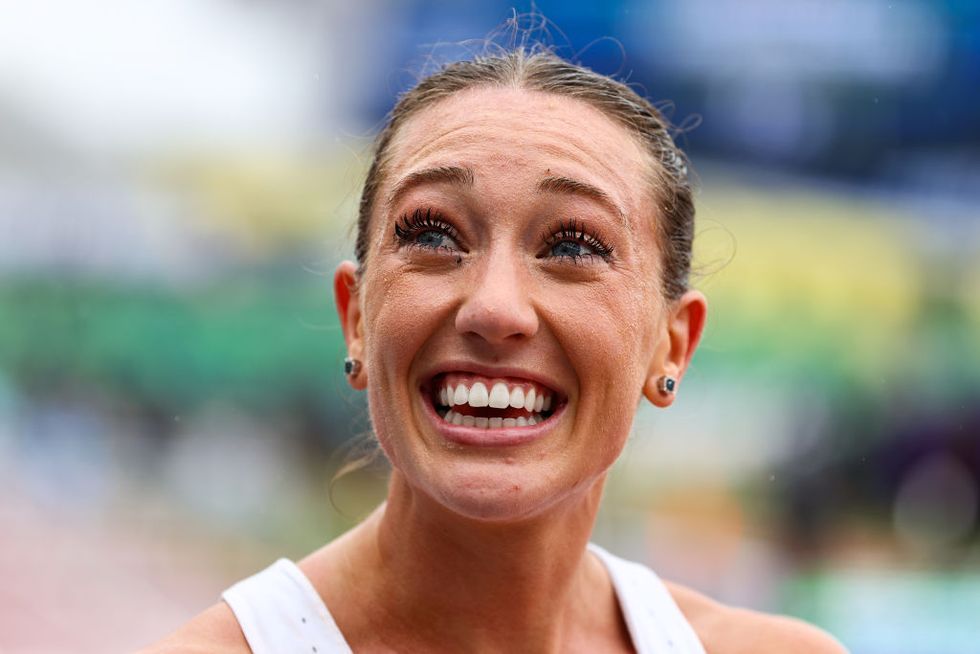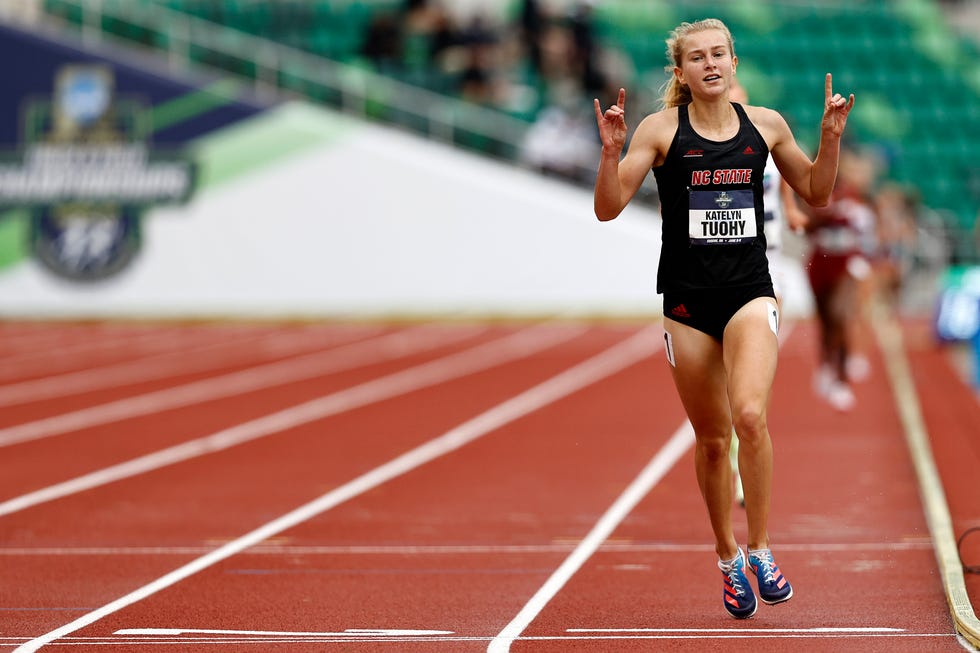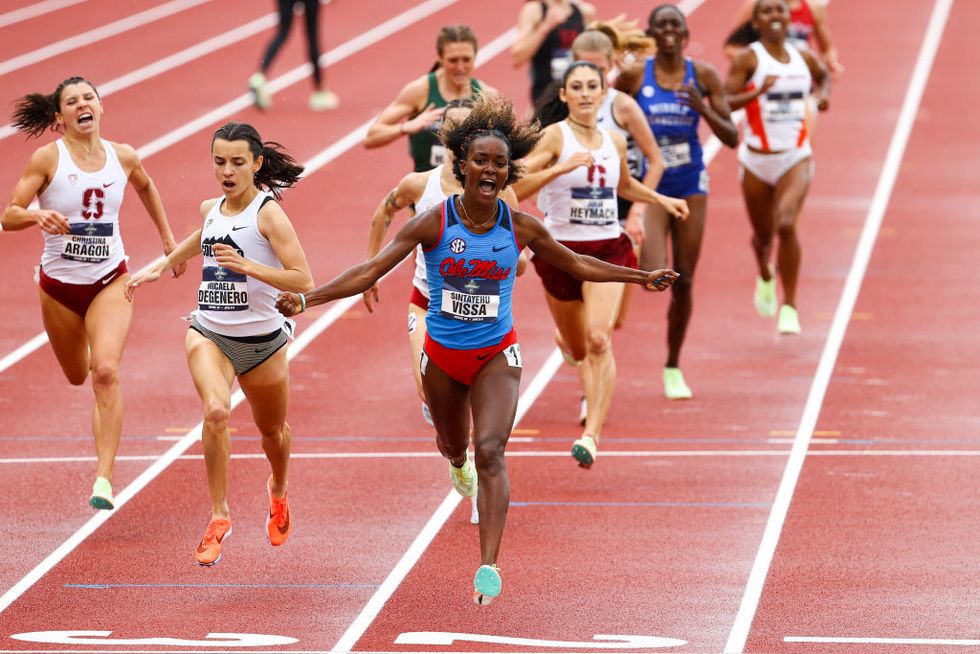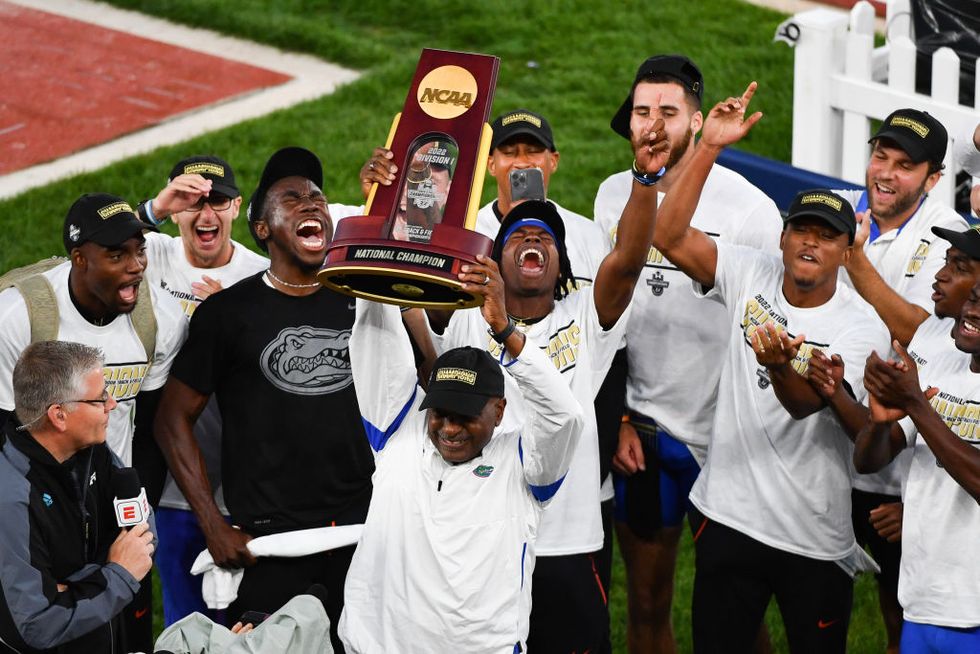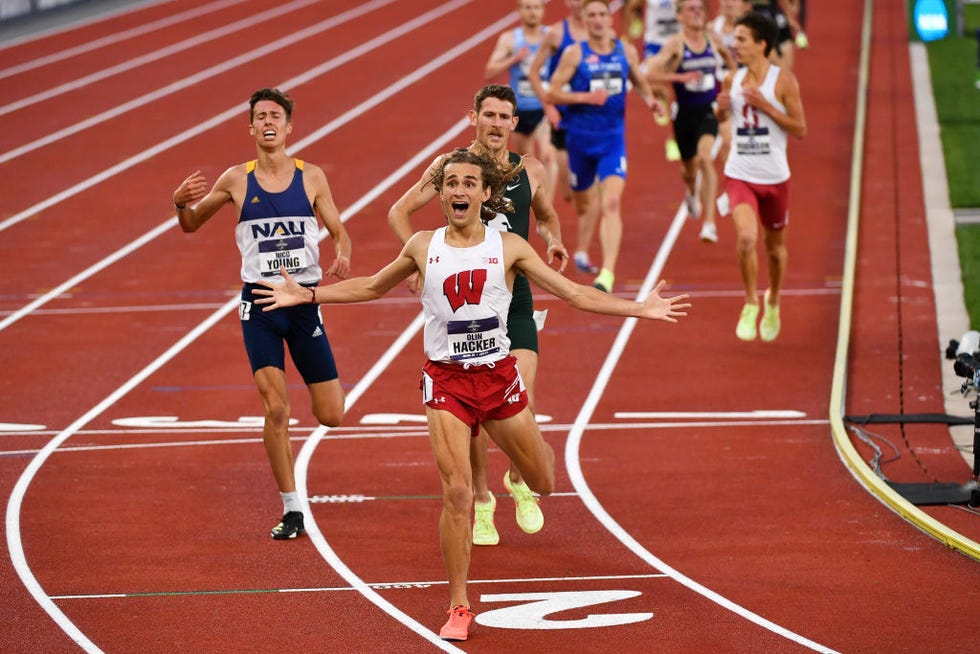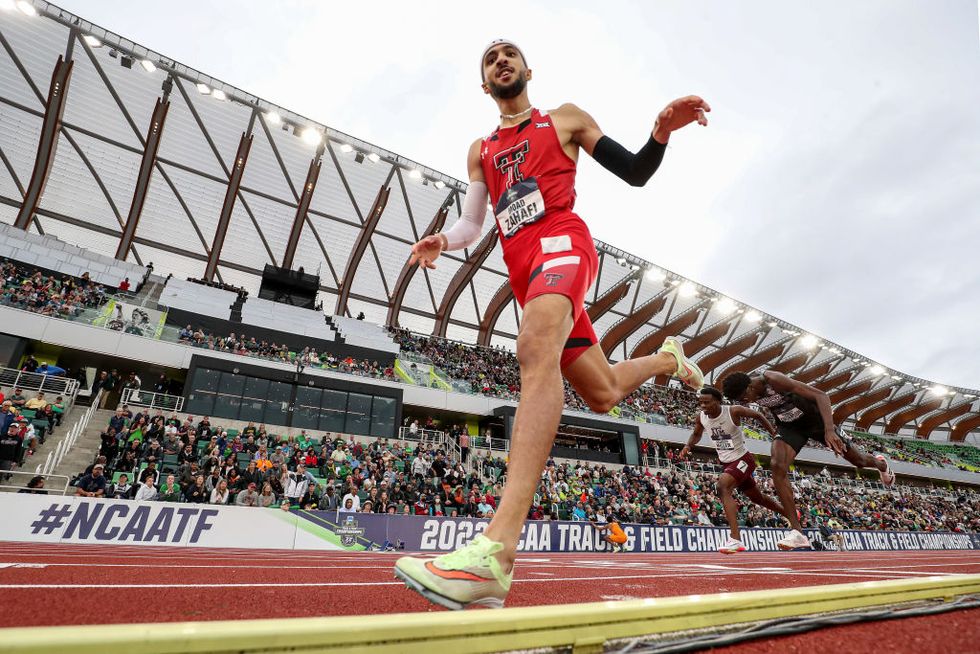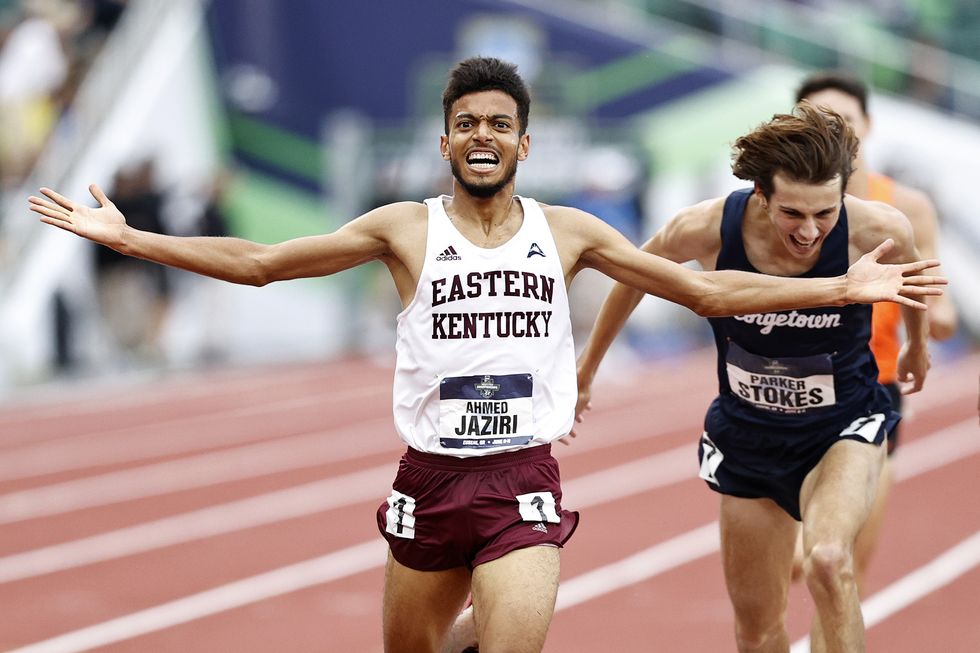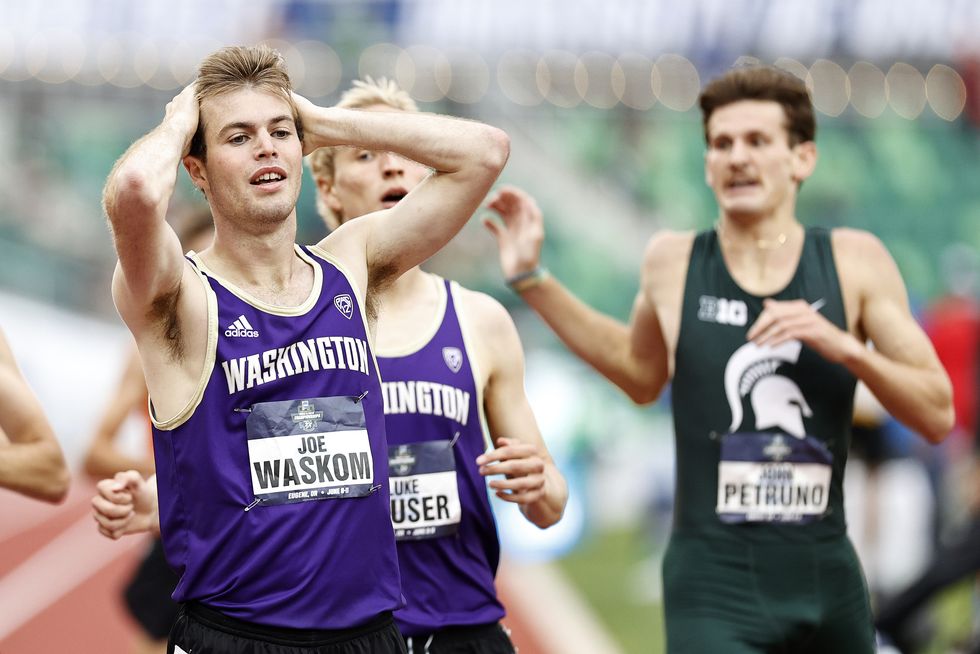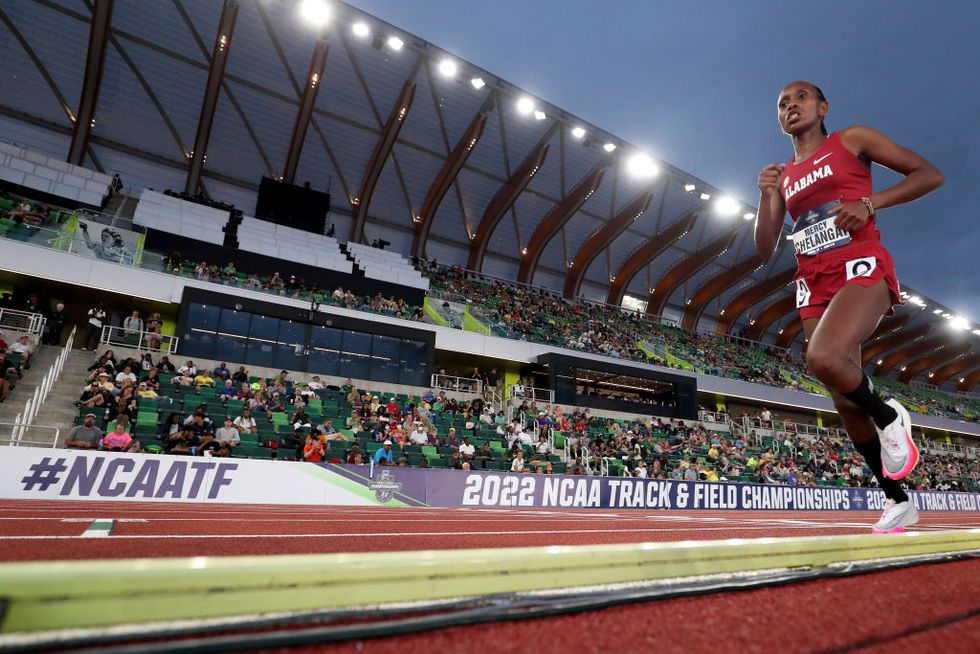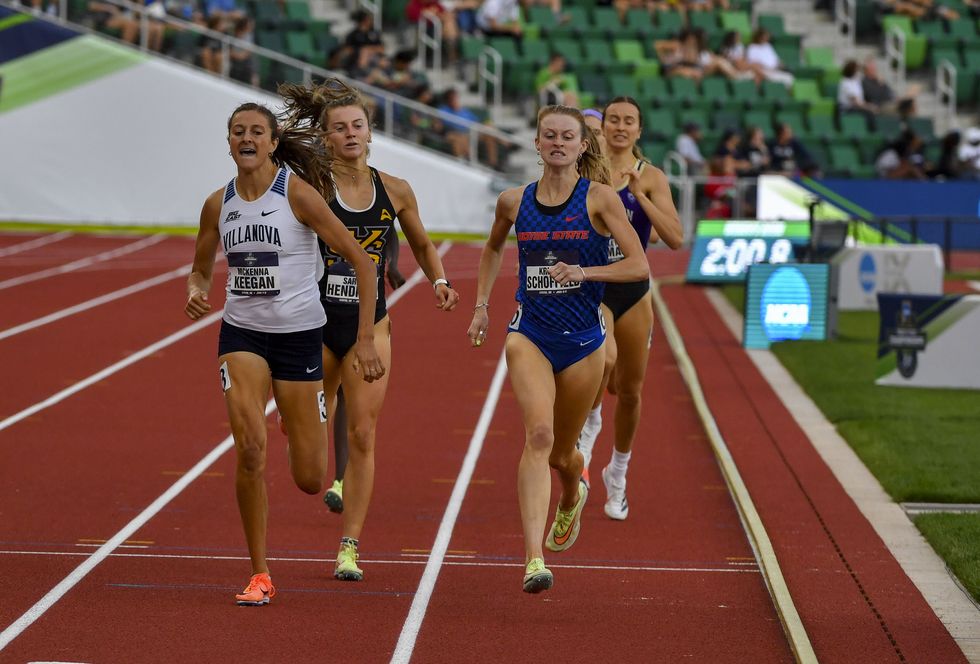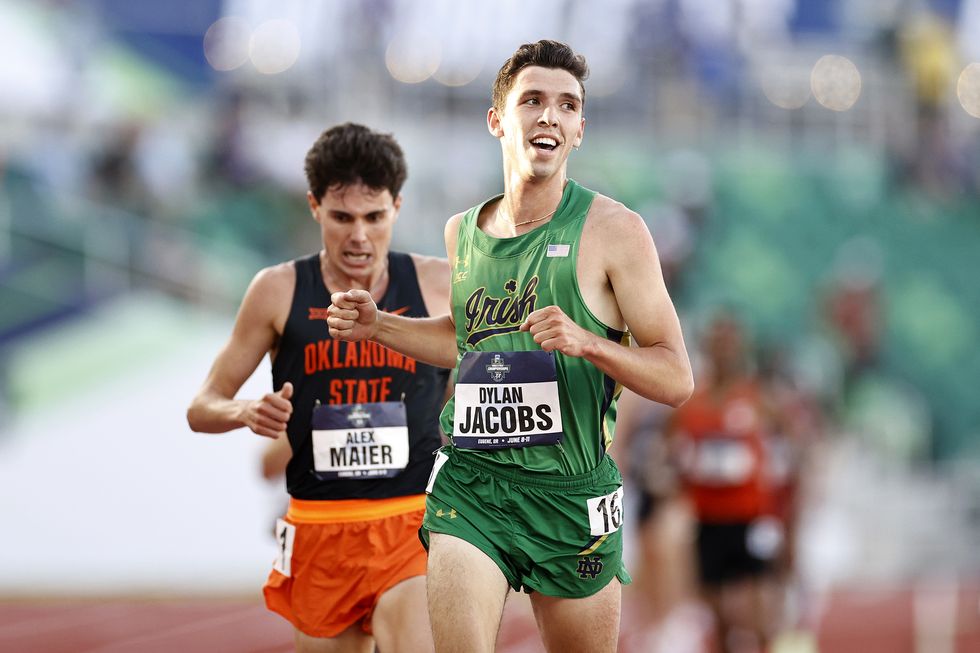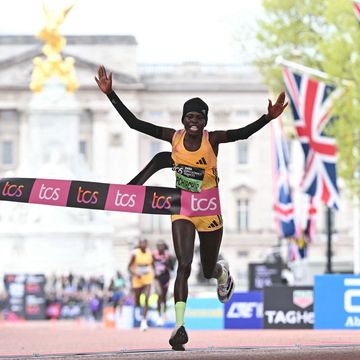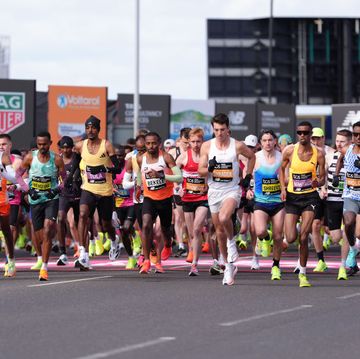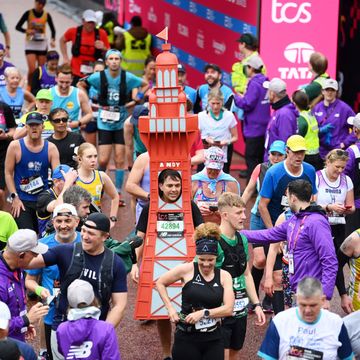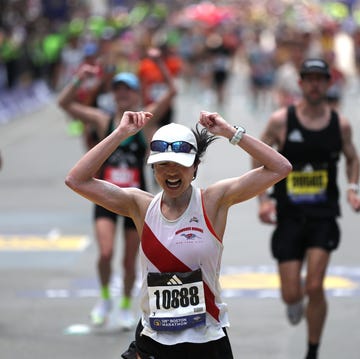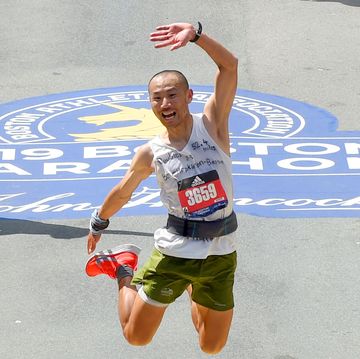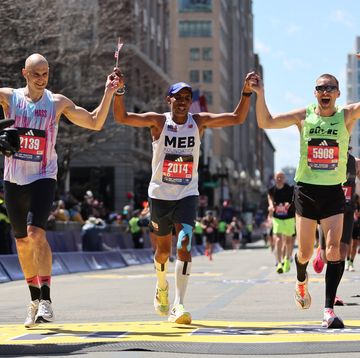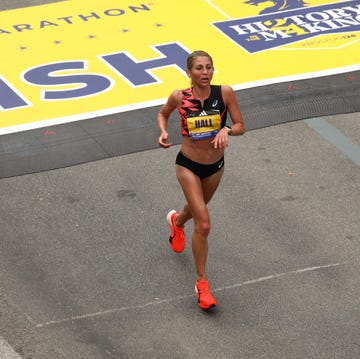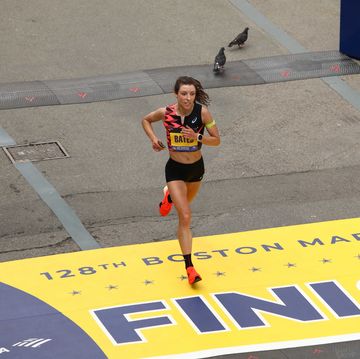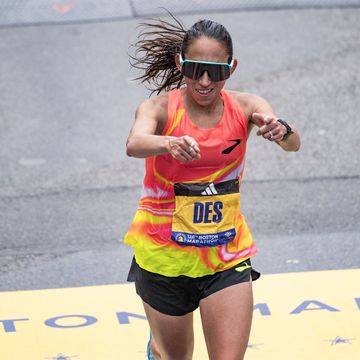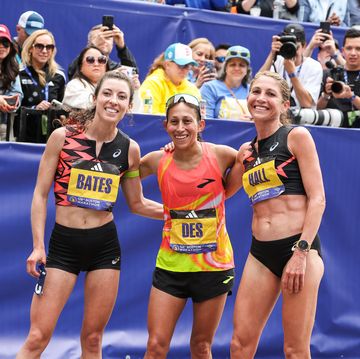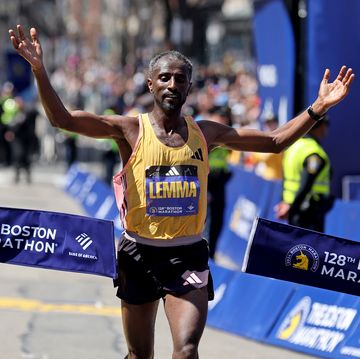The NCAA Outdoor Track & Field Championships returned to Hayward Field this week, with the Florida Gators coming out as the major winners of the event. Both the women’s and men’s teams took the top spot on the team podium, with the men taking the title on Friday with 54 points and the women dominating on Saturday with 74 points. It’s the first time since 2015 (Oregon) that both squads will take the national championship back to campus with them.
But of course, there were other major moments and record-breaking performances. Here are the highlights from each day of the 2022 NCAA championships.
Full NCAA Results | How to Watch
→You love watching the biggest races. So do we we! Join Runner’s World+ to keep up with the latest race coverage!
Saturday, June 11
Gators complete team national title sweep
University of Florida coach Mike Holloway hoisted his second trophy in as many days on Saturday afternoon, as the Gator women followed up the men’s team championship on Friday with a title of their own.
The Gators—garnering 74 team points—were impressive on both the track and field. Anna Hall was dominant in the women’s heptathlon and added a second place finish in the 400-meter hurdles. Jasmine Moore swept the horizontal jumps, winning both the long and triple jump. Talitha Diggs took home the 400-meter win with a 49.99.
Texas was second, 10 points behind the champion Gators, which claimed its first-ever team championship. Kentucky was third with 50 team points.
Collegiate record gets crushed in runaway steeplechase victory
Courtney Wayment left no doubt about it in the women’s 3,000-meter steeplechase. The BYU senior rolled to the national title in 9:16.00, breaking Courtney Frerichs’s collegiate record from 2016 by eight seconds. Frerichs is now an Olympic silver medalist and American record holder in the steeple.
Wayment went to the front early and quickly opened up a considerable gap on the field. She was racing the clock at that point and closed well in the driving rain to capture the win and the record. The time—a 10-second improvement on her previous personal best—makes Wayment the fifth best American all time in the event.
The moment caps off an impressive career for Wayment, who has won three individual national titles, along with a cross-country team championship in 2020.
“There was one moment my sophomore year. I had been injured for quite some time. I was going on like month five or six, and I hadn’t been running for a couple months,” Wayment said after the race. “One night I called [Coach Diljeet Taylor] at midnight and just said, ‘I don’t know if I can do this. I don’t think I can run. I don’t think running’s for me. It’s bringing me heartbreak.’
“Coach Taylor just said, ‘Wait until you’re healthy and then we can have this conversation.’ So we put it on pause. I’m really grateful that she always believed in me even when I didn’t believe in myself. Because I would have missed out on a lot of moments like this.”
Yale’s Kayley DeLay ran a terrific race to take second in 9:25.08, less than a second off Frerichs’s now-former collegiate record and a 16-second personal best. Ceili McCabe of West Virginia was third in 9:31.14, and Colorado’s Madison Boreman came across fourth in 9:33.02.
Kristie Schoffield takes the 800-meter crown
In a relatively wide open women’s 800-meter final, Boise State’s Kristie Schoffield came out on top, kicking to the NCAA championship in 2:01.09.
Baylor’s Aaliyah Miller took the race out hard, but an eager pack of challengers closed on the early leader on the second lap. Schoffield led the charge, overtaking Miller with 100 meters to go to take the lead. From there, Schoffield extended her lead as the others faded in the closing meters.
The field didn’t have a clear favorite going into the meet with each final qualifier with a season best around 2:01 to 2:02. Schoffield was the top qualifier from the semifinals on Thursday, and picked the right time to run a personal best in Saturday’s final.
McKenna Keegan of Villanova moved up from fifth to second in the homestretch to earn runner-up honors in 2:01.71. Gabija Galvydyte, an Oklahoma State freshman, was third in 2:01.76.
Tuohy gets her first NCAA title with 5,000 title
After a pair of runner-up finishes in the 3,000 and 5,000 meters at the NCAA indoor championships, Katelyn Tuohy of N.C. State has earned her first NCAA title. The Wolfpack sophomore pulled away late in the 5,000 meters to win her first national title in 15:18.39.
Tuohy pulled away from her competitors in the closing laps in the last individual event of the championship meet. Florida’s Parker Valby made a move to string the field out in the final mile, but Tuohy stayed on her heels and eventually made her winning move. Valby, who effectively clinched the team title for her Gators, placed second in 15:20.10
Tuohy made a name for herself in the high school ranks, where she had a record-setting career at North Rockland High School in New York. She showed her strength during the indoor season, but came up just short of an NCAA title in two different events.
But Saturday’s 5K was all about Tuohy, who kept the event’s title in-house after Elly Henes of N.C. State won the 5,000 meters last year.
Vissa flips the script from indoor and takes the 1500-meter win
Sintayehu Vissa of Ole Miss had “revenge” on her mind in the women’s 1500-meter final on Saturday.
Three months ago, Vissa took second place to Colorado's Micaela Degenero in the mile at the NCAA indoor championships. This time, though, Vissa held off the hard-charging Degenero to claim the national title in 4:09.42. Degenero was a close second in 4:09.62.
In that indoor final this past winter, Degenero looked like she was shot out of a cannon at the bell as she kicked to the win, with Vissa unable to answer as she finished in second. At today’s outdoor finals, Vissa went to the front on the backstretch, and Degenero was ramping up for her kick on the outside. Vissa held her off from the inside and maintained her kick in the final straight to claim the win.
Stanford’s Christina Aragon placed third in 4:10.00. Krissy Gear of Arkansas, who held the lead for most of the race, ended up fourth in 4:10.06.
Friday, June 10
Florida wins men’s NCAA team title
The Gators ended the men’s competition in style with the team title at the NCAA championships. On Friday night, Florida closed out the competition by winning the 4x400-meter relay in 2:58.88, officially securing the team’s fifth NCAA team title in program history. Thanks to decisive wins from Joseph Fahnbulleh in the 100 and 200 meters and a number of All-American finishes from runners in the sprints, the Gators dominated the men’s team race with 54 points, 16 points ahead of runner-up Texas.
Olin Hacker wins 5,000-meter crown 37 years after dad’s cross-country title
With a perfectly timed kick, Olin Hacker claimed the NCAA title in the men’s 5,000-meter final. The seventh-year senior from Wisconsin charged past Morgan Beadlescomb of Michigan State on the homestretch to win the distance crown in 13:27.73. Hacker’s performance came 37 years after his father, Tim Hacker, won the 1985 NCAA cross-country title for the Badgers.
“Coming down that straight, it’s what I dreamed of,” Hacker said. “The last hundred I was still so afraid I was going to lose it. It just did not feel real.”
For 12 and a half laps, a handful of title contenders attempted to set the pace and run away with the victory while Hacker kept himself within striking distance of the lead.
Early leader Casey Clinger of BYU found himself at the front for the first few laps but was overtaken by Aaron Bienefeld of Oregon, who held the lead until the field approached the 3,000-meter split. At that point, Adriaan Wildschutt of Florida State tried to separate himself from the field, but the leaders followed the increase in pace.
With 600 meters to go, Beadlescomb made his move to the front and attempted to use his 3:52 mile speed to hold off the competition. But Hacker tracked him down and passed him after the final turn, something he said he learned from his dad.
“That last 200 you stay on the shoulder and you hold it,” Hacker said. “My dad has taught me that for 10 years now. And then it’s just 100 to go, all you’ve got. Sitting on [Beadlescomb’s] shoulder, I knew I had another gear. I really thought that was going to be enough.”
Beadlescomb finished second in 13:28.38, and Nico Young of NAU placed third in 13:28.62.
Two days after winning the NCAA 10,000-meter crown, Dylan Jacobs of Notre Dame finished 17th in 13:39.21.
Moad Zahafi of Texas Tech remains on top
Just weeks after running a world lead in the men’s 800 meters, Texas Tech’s Moad Zahafi cemented himself as NCAA champion in the event. On Friday, the senior started the race behind early leader Brandon Miller of Texas A&M. He made his move to the front on the backstretch, where he passed Miller and held his position to the finish, winning in 1:44.49.
When asked after the race if he came in with a strategy in mind, Zahifi responded, “Yeah. To win. That’s my strategy.”
Zahifi comes from Morocco and will represent his country at the world championships in Eugene in five weeks. He said his family was watching at home, where it was 6 a.m. “They probably didn’t sleep yet,” he said. “They were waiting for this moment for a long time.”
Behind Zahafi, a homestretch battle between SEC rivals Miller and Navasky Anderson ended with the Mississippi State junior passing Miller for the runner-up spot. Anderson finished in 1:45.02, and Miller placed third in 1:45.09.
Four men run the world championships standard in historically fast 3,000-meter steeplechase
After keying off a blazing pace set by Duncan Hamilton, Ahmed Jaziri charged past the Montana State junior on the homestretch to claim the NCAA title in the men’s 3000-meter steeplechase.
The Eastern Kentucky junior won in 8:18.70, a personal best and 3 seconds faster than the world championships standard in the event. He also made a huge improvement on his 10th-place finish from the 2021 NCAA outdoor championships.
“I believe in what I have done this year, I believe in all my workouts. I’m in shape. Nothing could be much better than today, NCAA champion,” he said.
Hamilton led the historically fast race until the final 80 meters when Jaziri kicked past him. Parker Stokes of Georgetown also passed Hamilton briefly, but the Hamilton fought back and secured a runner-up finish by the slimmest of margins—0.002 seconds.
Hamilton (8:18.878), Stokes (8:18.880), Ryan Smeeton of Oklahoma State (8:20.06), and Ed Trippas of Princeton (8:20.29) all bettered the world championships standard of 8:22.0. The times run by Jaziri, Hamilton, and Stokes are now ranked second, third, and fourth in collegiate history. In total, eight runners improved on their personal bests in the steeplechase final.
Joe Waskom upsets the mile champion to win a tactical men’s 1500-meter final
Joe Waskom ended a breakout season by winning the men’s NCAA 1500-meter crown. The sophomore from Washington crossed in 3:45.48, just ahead of NCAA indoor mile champion Mario Garcia Romo of Mississippi. Garcia Romo finished in 3:45.69, and Sam Ellis of Princeton placed third in 3:45.82.
In March, Waskom made his NCAA track championships debut by contributing to the Huskies’ seventh-place finish in the distance medley relay. The momentum continued with a victory and personal best of 3:40.33 in the 1500 meters at the Pac-12 championships in May. According to USTFCCCA, Waskom is the Huskies’ first NCAA 1500-meter champion since 1928.
He was one of three Washington runners in the final, and all three scored. Luke Houser was fifth, and Nathan Green, a true freshman, was seventh.
The race went out slowly—the pack went through 800 meters in 2:09, which is basically jogging for them. With 600 meters to go, the pace had quickened considerably. Houser moved into the lead at the bell, and Waskom moved up to join him.
“I’m going to be honest, I thought I was going to shoot for top 5 today and see what happens,” Waskom said. “I got to the last lap and I was feeling pretty good. It was pretty slow, which is kind of how I like it now. I knew I could close in a 53. I knew it would take about that. I knew if I went at 300 to go I’d at least get to the lead. I didn’t know if I’d hold it, but yeah. I did everything I could today with the help of these boys.”
Seven men in the race finished with their final lap faster than 54 seconds.
Thursday, June 9
Chelangat claims first NCAA track title with 10K victory
Mercy Chelangat, a junior at the University of Alabama, won the women’s 10,000 meters at the NCAA championships, running 32:37.08 on a humid night in Eugene, Oregon. It was her first NCAA title on the track, after she finished second in this event last June.
Grace Forbes, a sophomore from Rice, was second in 32:48.07. Jenna Magness, a senior at Michigan State, was third in 32:59.96. Emily Covert of Colorado was fourth, Alexandra Hays of NC State was fifth, and Gabby Henteman of Oklahoma State was sixth.
Haley Herberg, a University of Washington junior, took the race out and no one went with her. She went through the first 1600 meters in a controlled 5:10, and by then she had opened a 10-second lead on the chase pack.
The lead grew to as many as 26 seconds midway through the race, and Herberg split 16:28 for 5,000 meters, well within her comfort zone. Would the chase pack of six—led by Forbes, with Chelangat right on her shoulder—be able to catch Herberg?
Gradually the chasers picked up the pace over the second half of the race, while Herberg ran steady 79- and 80-second laps. Chelangat passed Heberg with six laps to go and immediately opened up a large gap on everyone in pursuit.
But with a mile remaining in the race, Forbes had cut Chelangat’s lead to only four seconds, and it looked like she might make it a race. But Chelangat was too tough, and increased her pace in each of the final four laps. By the end, her margin of victory was 11 seconds.
“It feels amazing,” Chelangat said. “Last year, I came up short but this year it was mine, so it feels really good.”
Her strategy was patience, she said, and she wasn’t worried when Herberg got out to her large lead. “I know my strengths,” she said. “I know with five laps to go I can survive that pace until the end. When it was time to go, it was time to go.”
Chelangat next races the 5,000 meters on Saturday.
Forbes had a rough start to the season. For the first three months of the year, she could barely run 10 miles per week, and she was diagnosed with Hashimoto’s disease, a common thyroid condition that can result in low energy.
In addition, she had a difficult academic semester. She’s on the pre-med track and she’s studying 8 hours a day for the MCAT in August, she said. Given her many challenges, she’s proud of where she is.
"By 5K in, I was tired,” she said. “In my head I was just saying, ‘Don’t give up.’ I had the lead of the second pack almost the entire race, and I didn’t want to give it up.”
Heberg, the early leader, fell back in the pack over the final six laps of the 25-lap race and finished seventh. She still scored two points for Washington and earned All-American honors.
Co-favorite nearly misses women’s 800-meter final
The women’s 800-meter races went mostly as expected. In heat one, Gabby Wilkinson of Florida led until the final 20 meters, when Texas’s Valery Tobias passed her. Both women automatically qualified.
LSU’s Katy-Ann McDonald, who co-owns the fastest time in the NCAA this year with a 2:00.98, headlined the second heat. Aaliyah Miller of Baylor sprinted to the lead, splitting 58.6 for the first 400 meters. But Miller would fade over the last 100, as Oklahoma State freshman Gabija Galvydyte overtook her to win in 2:02.46. McDonald finished second in 2:02.51, as Miller took third to earn a qualifying spot too.
The other co-owner of the fastest time in the NCAA, Sarah Hendrick, experienced a scare in the third semifinal. Hendrick sat right on Boise State’s Kristie Schoffield through 400 meters, even pushing for the lead by 600, but faded over the final 200 meters. Schoffield earned the first qualifying spot, followed by McKenna Keegen of Villanova, who made a mad dash down the final straightaway for second. Hendrick would settle for the last time qualifier.
A fall causes drama in heat two of the women’s steeple, but favorites still qualify
Viewers got an early taste of the steeplechase final by watching the first heat. Courtney Wayment of Brigham Young University and West Virginia’s Ceili McCabe, who ran the top two times in the NCAA this season, held the top two positions until the last 400 meters, when Arkansas’ Logan Jolly sprinted past to earn a personal best and top qualifying spot. McCabe and Wayment cruised it in for third and fourth.
Auburn’s Joyce Kimeli shot to the front of the second heat. However, the pace would slack, and most runners stayed in contention. The tight pack triggered a fall by Alissa Niggeman from Wisconsin, but she managed to get back up and qualify in third place behind Kaylee Mitchell of Oregon State, Madison Boreman of Colorado, and Kimeli. New Mexico’s Elise Thorner, who owns the third-fastest time in the country this year, also qualified.
Favorites easily qualify for Saturday’s 1500-meter final
There were no surprises in the women’s 1500-meter semifinals.
Christina Arargon of Stanford took the first heat out in just over five-minute mile pace. As expected, the women quickened over the final half of the race, and five runners separated themselves in the last 100 meters using sharp kicks. Emily Mackay of Binghamton University led the finals qualifiers in 4:21.44. Aragon and NCAA indoor mile champion Michaela Degenero of Colorado qualified behind her.
Knowing the two time qualifiers were up for grabs, the women in the second heat ensured a healthy pace. The field crossed 400 meters in 65, then 800 meters in 2:15. Sintayehu Vissa of Ole Miss—one of the favorites to win the title—crossed first in 4:13.13, followed by sixth seed Julia Heymach of Stanford. Behind Illinois’ Olivia Howell in fourth, five women battled down the home straight for three qualifying spots. Melissa Tanaka of Stanford barely squeezed in to take the last qualifying spot, making it three runners in the final for the Cardinal.
Wednesday, June 8
Dylan Jacobs comes back from a fall to win the 10K
In the men’s 10,000 meters, the first track final of the 2022 NCAA championships, Notre Dame junior Dylan Jacobs picked himself up from a fall early in the race, took the lead with 200 meters to go, and won in 28:12.32.
He held off a fast-closing Alex Maier of Oklahoma State University, who was second in 28:12.68.
Abdihamid Nur of Northern Arizona University finished third in 28:14.51. Nur, who was the prerace favorite after winning indoor national titles at 3,000 and 5,000 meters, had taken the lead with three laps to go, but he couldn’t close as fast as Jacobs and Maier.
Cole Sprout of Stanford was fourth, and Athanas Kioko of Campbell University, who opened up a large lead from the gun and extended that lead to 17 seconds early in the race before being swallowed up by the pack with six laps to go, held on to finish fifth.
“It’s better than I could ever have imagined,” Jacobs said of his win. “I’ve dreamed about this, I’ve trained with I think the best distance team in the country, prepared every day to come out to nationals and perform. And fortunately it worked out today where I was able to take it home. I’m so grateful for that.”
He said his fall, about eight minutes into the race, was his fault and not due to any collision. “I hit the rail. I was looking at my coach, who said, ‘You’re in a good position’ and I stepped on the rail.” He got up, got to the back of the pack and realized he was fine.
Although Maier runs between 100 and 120 miles per week in the summer, he had plenty of closing speed when it counted. He nearly caught Jacobs at the end. “I was joking with my coach, I might have PRed in the 400 there,” he said. His final lap was 55.50 seconds; Jacobs ran 55.45.
Jacobs will run the 5,000 meters on Saturday, as will Sprout and Kioko. Nur will stay in Eugene to cheer on his NAU teammates who are still competing and will ponder his future—he is mulling turning pro. He has qualified to race the U.S. championships in two weeks.
The favorites advance to the men’s 800-meter final
SEC rivals Navasky Anderson of Mississippi State and Brandon Miller of Texas A&M led the semifinal round by finishing 1-2 in the fastest times of the night. Anderson, the SEC champion, won heat 3 in 1:45.94 while Miller followed for second in 1:46.00.
World leader and NCAA title favorite Moad Zahafi of Texas Tech advanced by winning heat 2. The senior from Morocco eased up right before the line to finish in 1:46.66, a conservative effort compared to his season’s best of 1:43.69. Sean Dolan of Villanova finished second in 1:46.96, a personal best.
Jason Gomez of Iowa State also ran a personal best to win the first heat. The junior finished in 1:47.02, just ahead of runner-up Yusuf Biziman of Texas who earned an automatic qualifying spot in Friday’s final.
Two podium contenders fall short in the men’s 1500-meter semifinal
Both heats of the men’s 1500-meter semifinal saw shocking results with two podium contenders failing to qualify for the final.
One month after breaking the collegiate record in the 1500 meters, Eliud Kipsang of Alabama faded in the latter half of heat 2. The sophomore finished last in 3:42.30. After taking control of the pace early on with an 800-meter split of 1:55, Moroccan Olympian Anass Essayi of South Carolina pulled up suddenly on the last lap of heat 1 and did not finish the race.
With the collegiate record-holder and an Olympian out of contention, the men’s 1500-meter final is shaping up to be a breakthrough opportunity for up-and-coming competitors. Nathan Green of Washington, Sam Ellis of Princeton, Thomas Vanoppen of Wake Forest, John Petruno of Michigan State, and Joe Waskom of Washington all ran personal bests in order to advance.
After winning heat 2, NCAA indoor mile champion Mario Garcia Romo of Ole Miss will likely be in the mix up front alongside Jonathan Davis of Illinois, who won the first heat in 3:37.39, the fastest time of the night.
Duncan Hamilton runs an NCAA lead in the steeplechase semifinal
The men’s steeplechase semifinal saw a handful of massive improvements and teamwork heading into Friday’s final. Duncan Hamilton led the charge by blasting an NCAA lead in the event. The Montana State junior won heat 2 in 8:23.13, a personal best.
After the race, Hamilton said his goal was to establish a quick pace in order to help his teammate Levi Taylor advance out of a blazing first heat. The effort paid off when all of the results were compiled, and Taylor qualified based on his 8:30.20 finish. “I’m stoked on that, ran a fast time so it was a good day,” Hamilton said on the ESPN broadcast.
In heat 1, the field was led by Kenneth Brooks of BYU, who shattered the 8:30 barrier and took seven seconds off his previous personal best by winning in 8:24.88. Behind him, Parker Stokes of Georgetown, Ahmed Jaziri of Eastern Kentucky, Ryan Smeeton of Oklahoma State, and Estanis Ruiz of Loyola Marymount also dipped under the mark.
